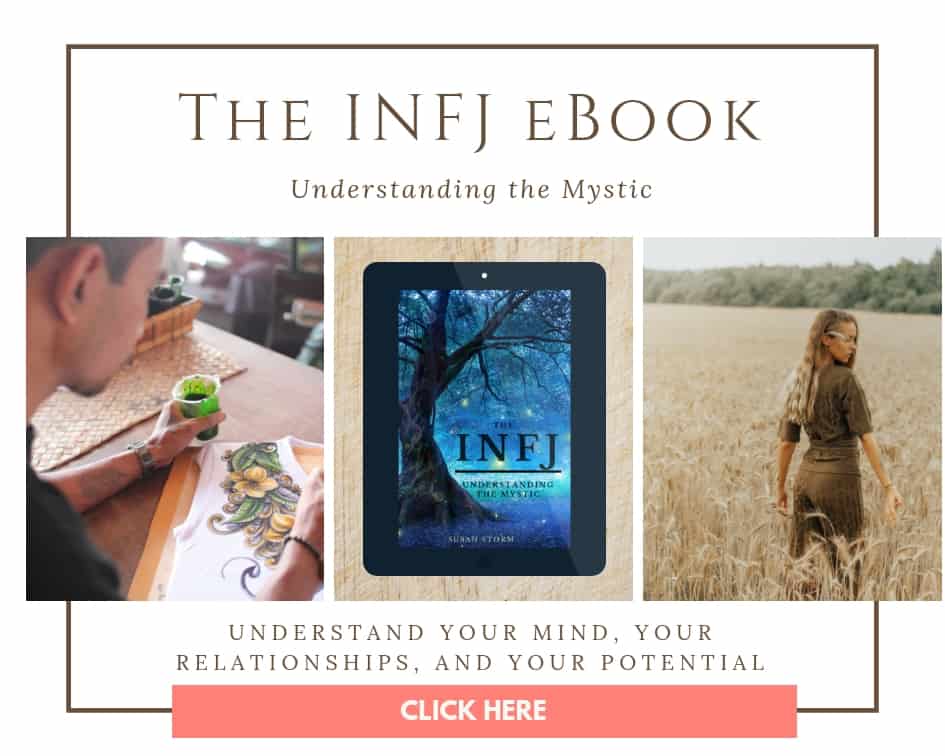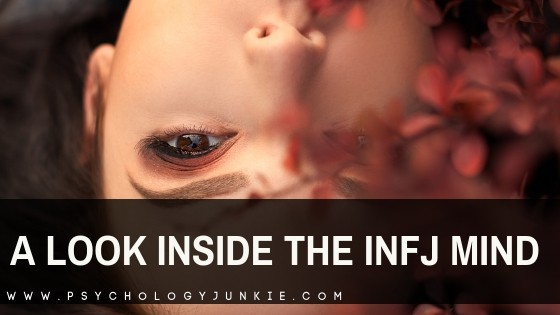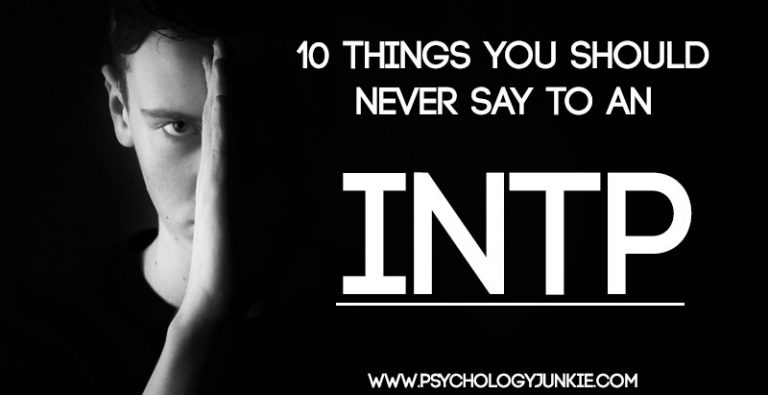The Unhealthy INFJ
One of the best benefits of learning about your personality type is learning to see your blind spots and weaknesses and find effective ways to deal with them! Most type descriptions out there will describe a healthy version of a type. This is good because it allows us to see ourselves at our potential! But what if someone isn’t really at their best? What if we’re trying to type someone who is unhealthy, repressed, or imbalanced in some way? What if we’re the ones who are unhealthy or imbalanced and we’re struggling to relate to these one-sided descriptions?
Well, that’s where this post comes in. In this article, I’m going to show you how to recognize unhealthy INFJs and the weaknesses that INFJs can fall into when they don’t have balance.

Keep in mind, I love INFJs. This article is not meant to “bash” INFJs in any way at all. Every single type can be unhealthy, this article just gives us ways to spot imbalance in ourselves so we can avoid hurting ourselves or others. It can also help us to spot when others are unhealthy and we can be more understanding of them.
Not sure what your personality type is? Take our new personality questionnaire here. Or you can take the official MBTI® here.
P.S. If you want even more in-depth information on INFJs and relationships, careers, parenthood and more check out my eBook: The INFJ – Understanding the Mysti
The Basic, Healthy INFJ
Healthy INFJs quickly see numerous perspectives and abstract connections in themselves and the world around them. They pick up on unconscious meanings and symbols that relate a future outcome or prediction. They are good at finding creative ideas and strategies, and they are motivated to help people. They tend to be idealistic and visionary in their approach to life. They are always trying to discern “the big picture” and meaning behind everything. You can find out more about INFJs in my book, The INFJ – Understanding the Mystic.
The INFJ Function Stack:
Dominant function: Introverted Intuition
Auxiliary function: Extraverted Feeling
Tertiary function: Introverted Thinking
Inferior function: Extraverted Sensing
5th/Opposing Role: Extraverted Intuition
6th/Critical Parent: Introverted Feeling
7th/Trickster: Extraverted Thinking
8th/Demon: Introverted Sensing
Some INFJ Weaknesses
INFJs will naturally value their top three functions a great deal. Like all types, they are at risk of having a warped perception of their other 5 functions (Yes, we DO use all 8 cognitive functions!). As a result, INFJs can see their inferior Extraverted Sensing as meaningless, purposeless, irresponsible, or short-sighted. They can repress this function, ignore it, or devalue it in other people if they’re not careful.
Because Extraverted Intuition runs in the opposite direction to the INFJ’s dominant function, they can risk seeing it as overwhelming and confusing; a gigantic barrage of ideas that are out of focus and over-stimulating.
Because Introverted Sensing is the INFJs 8th function, they can risk seeing it as narrow, self-limiting, and needlessly picky.
Every type needs to be aware that all cognitive functions are useful and valuable. Being aware of these tendencies can help us to analyze our judgments before we make them, therefore improving our relationships with other types (in this case, our relationships with SJs, SPs, and NPs).
The Unhealthy INFJ
Unbalanced Intuition
The unhealthiest kind of INFJ will operate using a warped or distorted version of their dominant function, Introverted Intuition. They will repress their other functions and therefore become impractical and unrealistic, focused solely on their unconscious vision or image of the future.
Why Intuition and Sensing Are Both Essential
To avoid getting into this unhealthy state, we have to realize the important tie between the dominant and inferior functions. Introverted Intuition (Ni), as the dominant function is like a pole with Extraverted Sensation at the base. We prefer to use Ni but without the balancing power of Se, Ni becomes detached from reality and objective data. Se gives Ni balance, it provides the objective data, the raw, sensory material, and the sense of “realism” for INFJs to bring their ideas out into the world in a tangible, effective way. Unhealthy INFJs suppress Se to such an extent that they lose sight of the data, the real world, and the raw material. Their arguments and visions lose their accuracy because they don’t have the balance of Se.
“The inferior function both complements the dominant and creates a dynamic tension of opposites between them which serves to promote the individuation of the authentic personality….Introverted intuition that is completely untempered by extraverted sensation would be almost pathologically ungrounded, its visioning proclivity drifting off into irrelevant fantasy.”
– Mark Hunziker, Depth Typology
Does this mean INFJs should use Extraverted Sensing a lot? Not necessarily. Using the inferior function extensively can cause a great deal of stress, but we shouldn’t ignore it either. We should let ourselves be open to it and take moments to tap into it. For an INFJ this means stopping to take a breath; it means looking around, tuning into the present moment, noticing nature, the environment, and taking stock of tangible, observable facts.
“To really experience the inferior, we have to engage it in play. Such non-productive, disorganized activity is usually viewed as “irresponsible” and costly in our time-is-money world. But to develop the inferior, we must create a safe space where we can go to play and experiment despite the judgmental views of both external and internal adults.”
– Mark Hunziker, Depth Typology
When INFJs don’t do this, when they cut off their connection to Se, they become lost in their unconscious world and their visions and expect other people to follow along even though everyone else has no clue what they’re talking about. Eventually, this can lead to bitterness of others, of one’s self, and a feeling of not fitting in anywhere. These INFJs can cut off all opposing views, appear stubborn, closed-minded, arrogant, unyielding. They can also appear lonely, misunderstood, and depressed in their isolation
Unbalanced Feeling
The unhealthy INFJ tends to feel resentful of other people. Because of their auxiliary extraverted feeling, they feel pulled towards making others happy, but they see this as a distraction from their vision. They can become bitter towards the people they help, and they become easily overwhelmed when dealing with them. They may cut themselves off from people entirely, or do things to help people, but feel like martyrs in the process.
Secretiveness
The strange thing about the unhealthy INFJ is that you may really have no idea what’s going on inside of them. Over time, through trauma, imbalance, or bad experiences, they may have realized that they don’t fit into the world, that people don’t understand them. They become secretive about their ideas, plans, and identities. They figure the less they show the world, the less criticism they will face and the less people will try to change them. They may appear isolative, eccentric, guarded, mysterious, self-absorbed, and/or resentful. Getting through a work day and forming relationships can be strenuous and overwhelming for them.
The unhealthy INFJ can play ego-defensive survival games to try to get by in this kind of a mindset. They may try to shut off their emotions so they don’t feel their own loneliness and isolation. They may start to imagine that everyone around them is thinking bad things about them or hates them. They may struggle with thinking anyone different from them is “wrong” or immoral. They will feel like it’s them against the world, and that that’s their lot in life no matter what.
This is a really difficult place for an INFJ to be stuck in, but if they realize they’re stuck in this place then they’ve taken the first step towards getting out. Counseling is very effective for INFJs who are in this situation. If that’s not a possibility then finding ways to support and use both intuition and feeling will help. The auxiliary function’s main purpose is to support the dominant and to amplify personal growth. INFJs who can make time for inner intuition, but ALSO engage in extraverted feeling in a healthy way can experience immense personal growth.
More Mild Expressions of Imbalance/Unhealth:
Not every unhealthy INFJ is going to fit the exact description above. They may struggle with certain aspects listed, but not all. Here are some other weaknesses to look out for that are relatively common with INFJs.
Because INFJ characteristics don’t often “fit in” with a world primarily made up of other types, many INFJs feel that they have to suppress their natural styles. They may also try to awkwardly use their undeveloped or non-preferred functions. For example, when there’s a conflict that needs to be sorted out, they may just jump in and say “okay, everyone stop it and make up!” without giving anyone the needed time to sort through their disagreements and find solutions.
It’s natural for INFJs to become so opposed to conflict, via their auxiliary function, that they try to sort it out so quickly that they forget their own needs, their own desires, or the needs and desires of others. In their rush to “fix” things, they don’t allow the conflict to provide any real growth or effective change.
INFJs are very attached to their ideas and visions, and as introverted intuitives, they can struggle with communicating those ideas to others. In a workplace environment, they can find it very difficult to delegate or hand over their ideas or plans to others. They can become workaholics, insisting that their way is the only right way to get something done. INFJs don’t generally like delegating work and while they can make good mentors, they can struggle with telling people what to do or handing out responsibilities.
The INFJ Ni-Ti Loop
INFJs can also get stuck in a “Ni-Ti” loop between their dominant and tertiary functions (Introverted Intuition and Introverted Thinking). Because both of these functions are introverted they naturally feel comfortable to the INFJ. As a result, they can cut themselves off from relationships and get stuck in a cycle of envisioning, analyzing, and classifying, but to no tangible avail. They can become reclusive and dismissive of people and seem overly-critical when in this state.
The “Grip” Stress Phase
INFJs who are under extreme or chronic stress can fall into the “grip” of their inferior function, Extraverted Sensing (Se). When this happens, they can become suddenly impulsive, focused on sensory details, reckless, and thrill-seeking. They may take unhealthy risks or they may look for sensory pleasure in excess (overeating, binging on TV, drinking too much, etc,.). Some INFJs find healthier ways of experiencing Se; some clean excessively or over-exercise. Some even find good ways to deal with it; they get a massage, eat a healthy meal, or spend time in nature. You can find out more about “grip” stress here.
The Effect of Shadow Functions:
Every type can feel lost when dealing with their 5th-8th functions. These “shadow functions” are more unconscious to us and harder for us to tap into.
5th/Extraverted Intuition:
INFJs can “lock on” to a vision so completely that they shut out emerging information and possibilities which come through Extraverted Intuition. They can be so firm in their belief of a hidden meaning that they are unwilling to see alternative connections. That said, at times INFJs can use a combination of Ni and Ne to enjoy brainstorming and encourage an open-minded approach to life and new possibilities.
6th/Introverted Feeling:
INFJs can disregard Fi because they see it as “selfish” and out of touch with the needs of other people. At other times, they can use Fi in an unhealthy way; becoming locked into their personal wants, feeling critical of people with opposing values, and becoming self-absorbed in their own feelings. That said, there are moments of growth where INFJs can experience Fi in a healthy way. When this happens, they to tune in with what is really important, what their authentic, individual values are, and how to stay true to their desires.
7th/Extraverted Thinking:
Extraverted Thinking tends to be seen by INFJs as overbearing or rigidly controlling. When they try to use it themselves they can spend unnecessary time trying to establish order, but doing it in a misguided or haphazard way. At times they can enjoy systematizing and organizing their outer world, but as Ti-users, INFJs are more likely to focus on inner mental organization than outer organization. This is where many times the “Judger” stereotypes don’t fit INFJs. Because INFJs have a dominant perceiving function (intuition) and because Te is their 7th function, they can actually appear much more disorganized and indecisive than judging stereotypes would imply.
8th/Introverted Sensing:
INFJs often have a tendency to ignore past data and experience. They may forget details from the past very quickly and disregard the “tried and true” method, finding it boring or overly-traditional. When extremely stressed, they may get stuck re-playing their failures from the past, feeling ashamed and embarrassed for no real purpose. As INFJs mature, they can eventually make peace with introverted sensing, and see the importance in details and methods from the past and how they tie into the context of their current lives.
Find out more about the shadow functions here.
Want to meet your potential as an INFJ and understand more about your gifts, strengths, weaknesses, and abilities? Check out my eBook here!
I Hope This Was Helpful!
Each type can be healthy or unhealthy or somewhere in between! Do you have any input or experiences to share? Let us know in the comments!
Other Articles You Might Enjoy:
10 Intuition Hacks for INFJs and INTJs
10 Stress-Busting Tips for INFJs
The Four Reasons INFJs Struggle with Loneliness
Sources:
I didn’t just come up with this information on my own! These books provided incredible insight into the healthy and unhealthy versions of INFJs. (Links are amazon affiliate links).
Understanding Yourself and Others: An Introduction to the Personality Type Code
Depth Typology: C. G. Jung, Isabel Myers, John Beebe and The Guide Map to Becoming Who We Are
Was That Really Me?: How Everyday Stress Brings Out Our Hidden Personality
Get Your Free INFJ eBook
As a thank you for subscribing to my newsletter I will send you this free eBook PACKED with self-care tips, creativity hacks, and more! You'll also get a 3-day email course for understanding your personality type better!










I honestly have to disagree with A LOT written here. I am an INFJ. You write from the ‘outside’, and have no real clue what is truly inside an INFJ. Outsiders never understand, see things from their won perspective, and always try to change what doesn’t need to be changed.
Interesting! I’d love to know what you disagreed with so I can analyze where/if I’m wrong in here somewhere. I’ve always identified as INFJ and am not trying to show them in a bad light here at all, just explain some ways in which they can be unhealthy (as all types can be). But more specifics are always helpful to ensure that I’m giving out accurate information!
That’s interesting – I felt this described me to a T. Very helpful article – thank you.
I’m an INFJ and freshman in college. The stress I’ve experienced in college definitely has shaped me into your exact description of an unhealthy infj. My personality was so different from what I was used to when I was happy and healthy that I struggled to understand and control myself. I still do and have even questioned if it might be depression. Though I’m sure it wasn’t the intent of this article, I’m now relieved to understand that there is a method to this madness and a very logical explanation rather than a depression diagnosis.. which is depressing. What I’ve felt most lately is misunderstood, even by my own self, but reading this has brought me immense comfort and optimism. I also appreciate the positive tone throughout the article despite the subject matter. It was very encouraging, understanding, and informative without being hypercritical. I can definitely see myself using this as a point of reference throughout my self-improvement process.
Susan, I have found the INFJ articles on this web site very interesting and rewarding. I am in my late 60s and have been round the MBTI loop several times over the decades. It’s only in the last few weeks that I have identified with the INFJ type, and it has felt like a homecoming. The penny dropped when I realised Se was my inferior – as an example, after an hour or two of driving I become spaced out. I react similarly to other forced Se situations, which send me quickly into accident mode if prolonged. I am definitely introverted, hate conflict, am very sensitive to ambient feelings, and have a rich inner life and vision. All the publications that describe what it is like to be of INFJ type seem much closer to how I experience myself than other types, so why the difficulty in identifying with this until now? There are several reasons I think, but the one I’ll pick out here is this: when I was a child, aged 7 – 12, I was sensitive, timid, overweight, clever, opinionated – not likely to make me popular with people my own age, and I often went through a lot of pretty awful bullying and censure from the other kids. In compensation, I found I could get lots of affirmation and validation from teachers and other adults by being cleverer than my contemporaries and by being “good”, and I carved out a tower to live in this way during my early teens from which I could look down on them safely. I have made a lot of success over my lifetime using the skills I developed then – Te/i and Si as well as Ni of course. Since my childhood, it seems I have a partially unconscious distrust and fear of people that I handle by establishing a superior position over them, at least in my own mind. I think my Fe went underground in my teens and I use it instinctively and defensively to suss out people’s weak points, then Ni and Si/Ti/Te to finish off the process (of course this sounds more black and white here than in practice – at least I hope it is!). This is a behaviour I have only begun to understand since reading many INFJ focused articles such as yours, and I can now start to do something about it – though sadly, Ni / Ti understanding by itself won’t square this circle. I’m pretty sure this is one of the reasons my use of MBTI typing questionnaires has not given reliable results. The first one I took over 20 years ago came out INTP (borderline J), very much influenced by my then work situation as well as the above. I’m glad I didn’t try to use that type for personal development because I would have treated my Secondary as my Inferior, with possibly unfortunate results. As an aside – it strikes me that some of the people who could benefit most from having an accurate type description are the more likely to be mis-typed and led astray harmfully in how to develop themselves if they just use the more mechanical questionnaire methods without help.
I am in my early 40’s and recently discovered I am an INFJ. I find myself exhibiting a lot of unhealthy attributes. I believe I’m in the grip. So much so that I’m writing this comment to cyberspace because I have absolutely nobody to talk to. I am going through a messy divorce from a narcissist. I’m trying to battle with my first ex over my three daughters. I lost my job. I think I’m addicted to drugs. I lost my house. I have a car and my life’s possessions in storage. I sound like a terrible country song. I am blessed, lucky, or whatever to have my mother living in a neighboring city who took me in and funds my existence for now.
The point in all this is to say reading these articles help me…and frustrate me. I feel less alone. But I feel so drained by the thought of all the tasks I have to complete. I can’t seem to get anything done. This low motivation and distractibility comes on the heels of months and months of compulsively cleaning and organizing. I was very motivated to take care of my daughters, to cut off contact with an abusive husband, to get working and get on with my life. One thing I’ve never been with myself is patient. I’ve never been kind to myself either. I am one of those who replays past failures over and over and over again. I don’t even know who I am anymore. Does any one have any kind of suggestion that might be something I can do. I would do counseling ( tried two different ones recently), but they are hard to come by in my area and all I can get without insurance are interns. I’m rambling so I will just stop here. Thanks in advance for any insights to hoist me out of this hole I’ve been occupying for far too long.
I know this might sound like a ridiculous idea if you are not a believer..but did you maybe try praying? like, praying really hard?? I am an INFJ too and it can be tough… now I am disappointed that I found the traits of unhealthy infj in me…
I’m with Klaudia…if I had the energy and capacity or permission to share my story I would, but to keep it short and sweet JUST BELIEVE. For you are not who you are by chance. I know the darkness you speak off, not necessarily the same circumstance but most definitely dark enough to wake up with my world shattered in a million pieces for the sacrifice of “loving” … I would and somewhat still do beat myself up over it. That sting that pierces my chest when I am reminded of what was once a few feet from the best year(s) of my life. An artist by heart, my release was to be the crown of all my hard work and dedication. I went from having everything I needed to produce to my hearts content and then some. But in just a few short month I took multiple “misfortunes” that just kept delivering the blows that eventually didn’t even register due to the numbness. Lost, over burdened and yet to fully clean and organize my home and business documents, studies, notes, etc (6months later) with not much but a Togo plate my mother brought my way. To say I am out of dodge is far from true, for like you I also picked up a heavy addiction that for the most part provided temporary aid but at a great cost to my body, my few semi-understanding relationships, my relationship with my daughter…etc. I’m sure you can feel these words almost as much as I felt yours. I was there as you expressed it. (INFJ)…
WHAT Klaudia and I are suggesting, is the best and ONLY solution. I might not be out the woods yet, but I have been faithful in belief and patience…
Trust me, I had days where I literally just wanted to break every thing just to say I took my frustration out on something only to be trying to fix what wasnt damaged in the first place and only adding to that plate. I suspect you might be doing the same. Drugs can really take over and dependency in such a state of affairs .can really make them look as the only alternative that pain that seems only accumulate unto a heavy burden.
And that is where Our Creator comes in…He took the cross when I was about to faint (figuratively speaking) I can’t say I am religious, but I do know that we as INFJS have ONE thing in common.
WE ARE THE POSTER CHILD OF INTUITION…
Tap into the source that gave you such a gift and see what more in store awaits. I am certain you will never see a more Willing and Able friend at your side at all times. YOU JUST HAVE TO ASK…And even if guilt makes you feel unworthy…no worries just keep an eye out for the magic that will take place if your looking.
Best wishes…if u need an ear to vent or just simply talk to someone that can share similar experience then email me. I know your pain to an extent…and I know we suffer much for this heart we were given…
[email protected]
Forgiveness is also KEY of YOURSELF and Others. The bridge looks big until you crossing it…
This is spot-on and helpful! I needed to read this! Thanks!
A great read – very insightful. Although I appreciate reading about INFJ gifts and positve attributes, it’s helpful for my soul growth journey to learn about our negatives too. MBTI seems to veer more towards the +ve and I’ve been used to learning more about the -ve aspects from the enneagram (that veers more towards the -ve imo. This article helps to give me a more complete MBTI picture.
As an INFJ I do of course tend to focus on self-improvement, critiquing myself pretty much constantly (well no much now actually having done intensive inner work) so it feels like there’s a need to be as balanced as possible in seeing what is good and not so good about being an INFJ.
I can’t wait to explore your website! Thank you 🙂
I’ve been studying mbti for years and thought I was an INFP (with a pervasive feeling that it wasn’t right) until I read this and your other unhealthy type descriptions. Wow does the unhealthy INFJ description fit me. Maybe because I’m a 4w5 I’ve always had a negative perception of Fe and an admirable perception of Fi? I know a lot of people ‘want’ to be INFJs but I can say that’s never been me. I’ve got much to mull over. Thanks for this.
Thank you! I think you (and CG Jung) just solved most of my problems/questions that I have been trying to figure out for the past years.
Similar to the last comment, I as well bounce back and forth contemplating if thee (me) INFJ is really that “special”. I tend to see myself in the INFT but only on occasion, which definately gives me the little space I need from myself at times. I tend to “tunnel” trough issues ( not to mention multiple/burdensome) with a air or confidence regardless the “circumstances” and I must say that, without offense to anyone I can only give credit and thanks to my/our Creator… for every dark valley I was guided across. With time and experience I learned to trust that warm sensation in sure other INFJS can relate too. I’m not one to believe in coincidence… and I must say…never has it ever been. Partly it isn’t such a “physic” gift, but a keen eye and attention to de-tale that tells you the story behind future events. It can get heavy and I personally feel partly responsible when things happen and I “called it”…but it’s no different than the “domino effect”…it just gets heavy over time and that’s when we need an outlet. I love what you are doing here. Truly without exaggeration, you could very well be sparing me a tragic ending to what I thought was simply put “the saddest truth”…I appreciate the reminder and inspiration you provided with this insigthful page and the view on those demons we try hide…even from ourselves at times. Only to find that that demon has really been the only one that truly understands us. IRONY. LIFE IN A NUTSHELL. 🙂
Can you explain more or write another article about how an unhealthy INFJ can become healthy? I live in the rural Midwest without access to psychiatry and have a lot of the negatives described above. I’m looking for help – it’s quite a struggle when I know no one like me and get sucked into my own negative perception of myself and everyone around me. Thanks.
I am grateful for your article, but as INFJ, I tell you all if you want more balance in your psychic engine, as I know it might be tough, try to read Lacan Orders, Nitzsche morphology and metaphorical world, Wittgenestein’s dealing withnon sense ,Alan Watts, Jung’s Archetypes, Shadow work and Animus Anima Logos Eros, more than anything you will need a worldview, then everything will fall on its place.
Email me if you need me: [email protected]
Enjoy reading your articles and it’s easy to relate as an infj.
Many blessings to you !
Thank you Riya!
Hey Susan!
I’m 13 years old.
Since I am a kid I daydream a lot. My teachers used to complain that I don’t pay attention to the class. I used to wait when I’ll return from school and daydream in my car because no one is there to disturb me. I also do that at night. Back then I used to complete my homeworks and was having a normal life.
But now I only daydream (very unrealistic one’s,not likely to happen) ,binge over YouTube and not completing homeworks or talking to people.
Sometimes I have a insight about something.
Am I an unhealthy Infj 4w5 thing or am I an infp?
Hi there! Daydreaming is such a fun thing to do, especially for INF types! It is totally healthy unless it’s interfering with your life and goals too much. I think it’s normal to struggle with focus at 13-years-old and you shouldn’t beat yourself up too much about it, but I hope you can find a way to find some balance between daydreaming fun and homework or human connections 🙂 Maybe for every 30 minutes of homework you allow yourself 30 minutes of fun daydreaming or YouTube time? Is there a deal you can make with yourself in that way? I totally understsand your predicament. I have always loved daydreaming and watching YouTube!